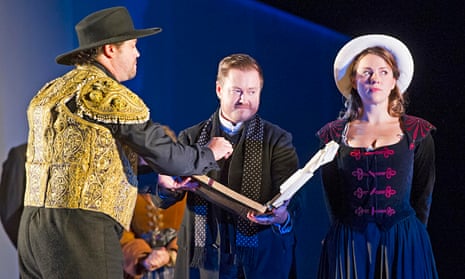Fiona Shaw’s production of The Marriage of Figaro got a mixed reception in 2011 when it was new at English National Opera. Back for its first revival with a new set of principals, it still leaves a downbeat, puzzling impression, neither joyously exuberant nor troublingly dark.
Intending, I think, to suggest that the tensions within an 18th-century aristocratic household on the brink of the French revolution still have relevance today, Shaw hops between past and present, with a mix of period costumes and self-conscious anachronisms, such as the upright vacuum cleaner that one of the numerous extras uses in the opening scene. But some sense of place is important in Figaro, and there’s little here. The use of cattle skulls as a design motif seems confusing, too. Do they signify the Count as a minotaur figure, the predator at the centre of the maze of Peter McKintosh’s set, or are they a cuckold’s horns – real or imagined, Figaro’s or the Count’s? Other ideas, including Basilio as blind and Barbarina paralytically drunk, seem gratuitous.
If it was performed with a bit more zest and wit, with character projected more strongly, such issues might matter less. The conductor Jaime Martín turns in a neat, lively account of the score. But with the shining exception of Mary Bevan, who with her dramatic awareness and quick wit as Susanna runs rings around both David Stout’s dour Figaro and Benedict Nelsons’s disappointingly awkward Count, nothing comes alive dramatically. The singing is generally decent and there are some sparky moments from Samantha Price’s Cherubino and Ellie Laugharne’s Barbarina. But as Sarah-Jane Brandon’s Countess shows in Porgi Amor, her second aria, however beautiful the sound, the words need to engage with emotion – in this of all operas. But there’s too little of that here.

Comments (…)
Sign in or create your Guardian account to join the discussion